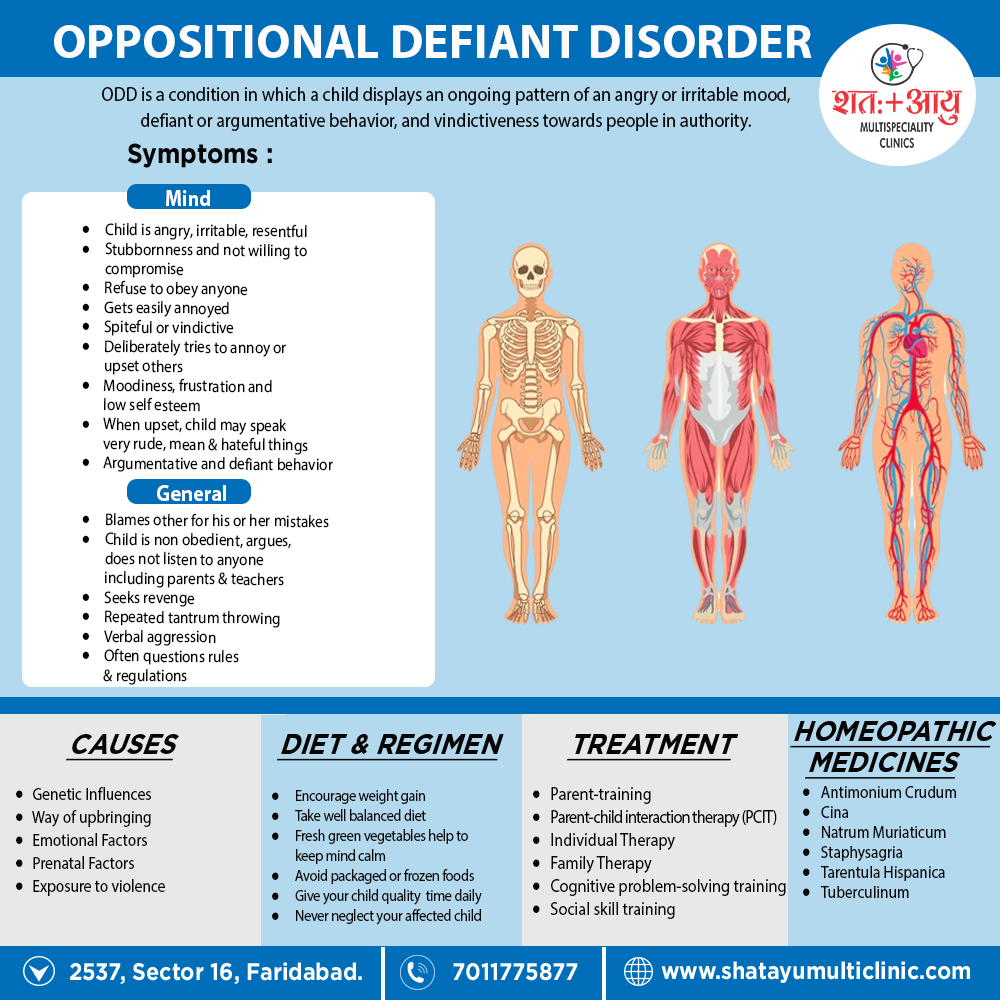Homeopathic Treatment
Homeopathic treatment for ODD is natural, safe and without any side-effects, and one can enjoy immense relief from these frustrating symptoms.
It is a patient-oriented science and medicines are prescribed on the characteristics of the individual rather than just the symptoms of the disease.
Few of our amazing remedies in Homeopathic treatment of ODD include:
Cina:
- Effective remedy especially for irritable & restless kids who are big, fat, and are always hungry.
- Child is very cross, petulant also dissatisfied with everything.
- Child hates if, he is touched, carried or rocked.
- besides this; Desire many things but immediately rejects when offered.
- Distressed also uneasy always.
- All in all, Bores his face in mother’s lap always and cries.
Natrum Muriaticum:
- Excellent remedy specifically; for abusive, weepy, brooding and irritable kids who crave salt.
- Especially; Suits thin, poorly nourished kids who are very thirsty.
- There is tendency to take cold.
- Symptoms increase typically from 9-11 am also under Sunlight.
- In detail; Do not like sympathy.
- Hate person who offends him.
- Lastly; Hasty behaviour, things drops down from hands.
Antimonium Crudum:
- Well indicated medicine for kids suffering from excessive anger and specifically who are very much abusive.
- Moreover; Irritable child who refrains from speaking.
- Child is mentally crude also has great appetite.
- Additionally; Suits kids who get angry without cause and have tendency to be fat.
- Children cry especially when either touched or washed.
- Angry at every little attention.
Homeopathic treatment for ODD offers a minimum of 50 remedies.
Anger:Children, In for example: (37)
3 Acon, 3 Anac, 3 Ant-t, 1 Arn, 1 Bac, 1 Bell, 3 Bry, 3 Caps, 1 Carb-v, 1 Carc, 4 CHAM, 1 Cic, 1 Cina, 1 Cupr, 1 Dros, 1 Hep, 2 Hoch, 1 Ip, 1 Kali-c, 1 Kali-s, 1 Kreos, 2 Lyc, 1 Med, 1 Op, 3 Phos, 1 Plac, 2 Plut, 1 Sanic, 1 Scorp, 1 Sil, 1 Staph, 1 Stram, 1 Syph, 3 Ter, 3 Tub, 1 Tub-k
Disobedient, Children for example: (8)
2 Calc-p, 1 Cham, 2 Chin, 2 Cina, 1 Med, 1 Thuj, 2 Tub, 1 Verat
Anger:Temper Tantrums for example: (77)
1 Acon, 1 Aml-n, 1 Anac, 3 Ant-t, 1 Astac, 3 Aur, 1 Aur-m-n, 3 Bar-c, 1 Bar-s, 1 Bell, 1 Bor, 1 Bufo, 1 Calc, 1 Calcul-b, 1 Canth, 1 Carc, 1 Carn-g, 1 Caust, 1 Cere-s, 1 Cham, 1 Chel, 1 Cic, 1 Cina, 1 Cocc, 1 Coli, 1 Cupr, 1 Cupr-acet, 1 Dpt, 1 Gado-n, 1 Germ, 1 Glon, 1 Heli, 1 Hep, 1 Holm-m, 1 Hyos, 1 Lac-drom, 1 Lach, 1 Lant-c, 3 Lon-p, 1 Luna, 1 Lyss, 2 Mag-c, 1 Mag-m, 1 Melal-l,
1 Mez, 1 Morg, 1 Mosch, 1 Nat-c, 3 Nat-m, 3 Nux-v, 1 Olnd, 3 Petr, 3 Phos, 1 Plat, 1 Plut, 2 Prot, 1 Puls, 1 Sac-alb, 1 Scorp, 3 Seneg, 1 Sep, 1 Sil, 3 Stann, 3 Staph, 1 Stram, 3 Stront-c, 1 Sulph, 1 Syc-co, 1 Syph, 1 Tarent, 1 Tell, 3 Ter, 1 Terb-o, 3 Thuj, 1 Thul, 3 Thyr , 3 Tub [1]

